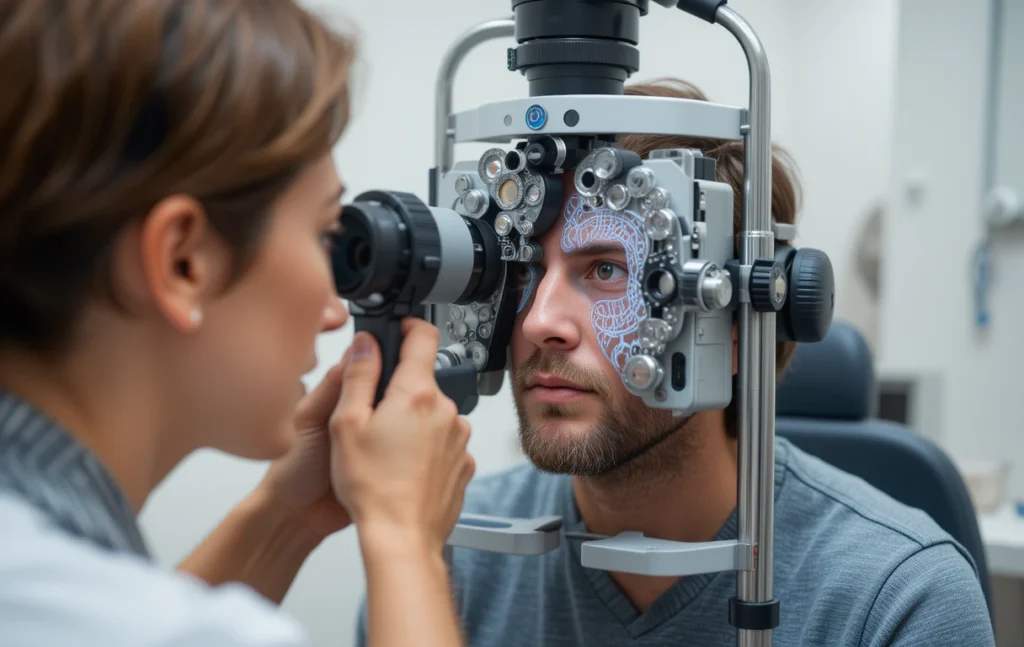
Imagine waking up in Karachi’s bustling mornings or Lahore’s vibrant evenings, seeing the world clearly without reaching for your glasses. For many Pakistanis, laser eye surgery promises freedom from blurry vision and the hassle of contact lenses. But what if your eyes are silently signaling that this procedure isn’t right for you? The dream of perfect vision can quickly turn into a nightmare if you’re not a suitable candidate. In a country where eye care awareness is growing but access to reliable information can be limited, understanding who should avoid LASIK is crucial to protecting your vision.
Laser eye surgery, particularly LASIK (Laser-Assisted In Situ Keratomileusis), is a popular vision correction procedure worldwide, including in Pakistan. It reshapes the cornea to correct refractive errors like nearsightedness, farsightedness, or astigmatism. However, not everyone is eligible. Certain health conditions, eye characteristics, and lifestyle factors can make LASIK risky or ineffective. This article explores laser eye surgery restrictions, helping Pakistani readers make informed decisions about their eye health.
Why Eligibility Matters for Laser Eye Surgery
The decision to undergo LASIK isn’t just about wanting clearer vision—it’s about ensuring your eyes can safely handle the procedure. In Pakistan, where dust, pollution, and seasonal allergies are common, eye health precautions are vital. LASIK involves creating a corneal flap and using a laser to reshape the underlying tissue. If your eyes or overall health aren’t suited for this, you could face complications like dry eyes, vision loss, or prolonged recovery.
The FDA outlines key reasons why some individuals are unsuitable candidates for LASIK. These include medical conditions, unstable vision, and even career-related risks. Similarly, experts at Washington University Ophthalmology emphasize that factors like corneal thickness and chronic eye conditions play a significant role in determining candidacy. Let’s dive into the specific reasons why LASIK might not be for you.
Who Should Avoid LASIK? Key Disqualifiers
Here are the primary factors that could make you an unsuitable candidate for laser eye surgery:
1. Unstable Vision or Refractive Errors
Your vision must be stable for at least a year before LASIK. If your prescription changes frequently, as often happens in young adults or those with hormonal fluctuations, LASIK may not deliver lasting results. This is particularly relevant for Pakistani youth in their late teens or early twenties, who may still experience refractive instability.
2. Thin or Irregular Corneas
Corneal thickness issues are a major concern. LASIK removes corneal tissue, so if your corneas are too thin or irregularly shaped (e.g., in conditions like keratoconus), the procedure could weaken your eyes, leading to serious complications. In Pakistan, where keratoconus is relatively common due to genetic factors, this is a critical consideration.
3. Chronic Dry Eye Syndrome
Dry eyes are a common LASIK complication, especially in Pakistan’s dry and dusty climate. If you already suffer from chronic dry eyes, LASIK can worsen the condition, causing discomfort or blurred vision. Pre-existing dry eye syndrome is a significant reason to avoid the procedure. For more on managing eye conditions in Pakistan’s challenging climate, check out this summer eye care guide.
4. Certain Medical Conditions
Several health conditions can interfere with healing or increase laser surgery side effects. These include:
- Autoimmune diseases (e.g., rheumatoid arthritis, lupus): These can impair corneal healing.
- Diabetes: Uncontrolled diabetes can affect eye health and recovery.
- Pregnancy or breastfeeding: Hormonal changes can alter vision stability.
- Immune deficiencies: Conditions like HIV may increase infection risks post-surgery.
5. Eye Diseases or Injuries
Conditions like glaucoma, cataracts, or retinal disorders make LASIK unsafe. Previous eye injuries or infections, such as herpes simplex affecting the eye, also rule you out as a candidate. For instance, glaucoma, known as the silent thief of sight, is a serious condition that requires careful management and disqualifies you from LASIK. Regular eye checkups, especially in urban centers like Islamabad or Rawalpindi, can help identify these issues early.
6. Age Restrictions
While LASIK is generally recommended for adults over 18, those over 40 may face challenges due to age-related conditions like presbyopia (difficulty focusing on close objects). Older Pakistanis considering LASIK should consult specialists to explore safe vision correction options.
7. Lifestyle and Occupational Factors
Certain professions, such as pilots or athletes, may face career-related risks with LASIK due to potential side effects like glare or halos. In Pakistan, where outdoor jobs like farming or construction expose eyes to dust and UV rays, these environmental factors can complicate recovery.
Verified Data: LASIK Risks and Statistics
To provide clarity, here’s a table summarizing key eye surgery contraindications and their potential risks, based on global health data tailored for Pakistani readers:
| Condition/Factor | Why It Disqualifies | Potential Risk | Prevalence in Pakistan (Estimated) |
|---|---|---|---|
| Thin Corneas/Keratoconus | Insufficient tissue for safe reshaping | Corneal ectasia, vision loss | ~1-3% of population |
| Chronic Dry Eyes | Worsens post-surgery discomfort | Persistent dryness, blurred vision | Common in arid regions |
| Unstable Vision | Results may not last | Need for repeat procedures | High in young adults (18-25) |
| Autoimmune Diseases | Impaired healing | Infection, poor recovery | ~0.5-1% (e.g., rheumatoid arthritis) |
| Diabetes (Uncontrolled) | Affects corneal healing | Delayed recovery, complications | ~26% of adults (diabetes prevalence) |
| Pregnancy/Breastfeeding | Hormonal changes affect vision stability | Unpredictable outcomes | Common in reproductive age groups |
Sources: FDA, Washington University Ophthalmology, and regional health studies.
This data underscores the importance of thorough pre-screening, especially in Pakistan, where conditions like diabetes and keratoconus are prevalent.
Eye Health Precautions in Pakistan
In Pakistan, environmental factors like pollution in cities such as Lahore or dry climates in Quetta can exacerbate eye conditions for LASIK. Regular eye exams are essential to assess vision surgery candidates. Clinics in major cities like Karachi and Lahore offer advanced diagnostic tools, but rural areas may lack access, making awareness critical. Always consult a certified ophthalmologist to evaluate your LASIK eligibility criteria.
Alternatives to LASIK
If you’re not a suitable candidate, don’t lose hope. Several safe vision correction options exist:
- PRK (Photorefractive Keratectomy): Suitable for thinner corneas, as it doesn’t create a flap.
- Implantable Contact Lenses (ICL): An option for those with high refractive errors.
- Glasses or Contact Lenses: Non-surgical solutions with modern, comfortable designs.
Discuss these with your eye specialist to find the best fit for your lifestyle and eye health.
Cultural Context: LASIK Awareness in Pakistan
In Pakistan, LASIK is gaining popularity, especially among urban professionals and students. However, misinformation and lack of awareness about laser eye surgery risks can lead to rushed decisions. Social media and local clinics often highlight success stories, but understanding who should avoid LASIK is just as important. By prioritizing eye surgery safety, you can protect your vision for the long term.
FAQ: Common Questions About LASIK Eligibility in Pakistan
1. Can I get LASIK if I have diabetes?
If your diabetes is well-controlled and your eyes are healthy, you may be eligible. However, uncontrolled diabetes increases laser surgery side effects risks, so consult your doctor.
2. Is LASIK safe during pregnancy?
No, hormonal changes during pregnancy or breastfeeding can affect vision stability, making LASIK unsuitable. Wait at least six months post-pregnancy.
3. How do I know if my corneas are too thin for LASIK?
A comprehensive eye exam, including corneal mapping, can determine corneal thickness issues. Most reputable clinics in Pakistan offer this test.
4. Are there age limits for LASIK?
Generally, LASIK is recommended for those over 18 with stable vision. Older adults (over 40) may need alternative procedures due to age-related eye changes.
5. Can environmental factors in Pakistan affect LASIK outcomes?
Yes, dust, pollution, and UV exposure can worsen LASIK complications like dry eyes. Proper post-surgery care is essential.
6. What should I do if I’m not eligible for LASIK?
Explore alternatives like PRK or ICL with your ophthalmologist. Non-surgical options like glasses remain effective and safe.
Conclusion
Laser eye surgery can be life-changing, but it’s not for everyone. In Pakistan, where eye health challenges like dust-related irritation and genetic conditions like keratoconus are common, understanding laser eye surgery restrictions is vital. By recognizing the signs that your eyes might say no to LASIK—whether due to cornea problems, medical conditions, or lifestyle factors—you can make informed decisions to protect your vision. Consult a trusted ophthalmologist, prioritize eye surgery safety, and explore safe vision correction options tailored to your needs. Your eyes deserve the best care—don’t rush into LASIK without knowing the full picture.


